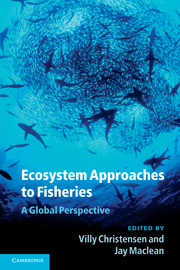Book contents
- Frontmatter
- Contents
- List of contributors
- Foreword
- Preface
- Acknowledgments
- 1 Introduction: toward ecosystem-based management of fisheries
- I Life in the oceans
- II Evaluating impact on marine life
- III Managing living resources
- IV The human side
- V Impacting policy
- 17 Linking conservation policy and science
- 18 Using the science
- 19 The scientist as communicator
- 20 Scenario development for decision making
- 21 The relationship between science and ocean policy
- Index
- References
19 - The scientist as communicator
Published online by Cambridge University Press: 05 June 2012
- Frontmatter
- Contents
- List of contributors
- Foreword
- Preface
- Acknowledgments
- 1 Introduction: toward ecosystem-based management of fisheries
- I Life in the oceans
- II Evaluating impact on marine life
- III Managing living resources
- IV The human side
- V Impacting policy
- 17 Linking conservation policy and science
- 18 Using the science
- 19 The scientist as communicator
- 20 Scenario development for decision making
- 21 The relationship between science and ocean policy
- Index
- References
Summary
As the state of scientific knowledge has advanced and scientists have peered into the ocean and seen its future more clearly, many have realized that it is not enough to publish their findings in academic journals. They have come to understand that the role of scientists has to change with times now dominated by industrial lobbyists, influence peddlers, spin-doctors, and professional contrarians. Fisheries ministers, for the most part, do not read peer-reviewed journals, and so if scientists are to share their wisdom with the wider world, they have to come out of their ivory towers to take to the public podium, return news reporters' calls, testify before policymakers, and let their knowledge be heard – or cede the debate to those who at best know far less, and at worst arrive with an agenda.
A call to arms of sorts came in a paper published in Science in 1998 and written by Jane Lubchenco, who was then president of the American Association for the Advancement of Science (and now Under Secretary of Commerce and Administrator of NOAA). She proposed a new social contract that would have scientists “communicate their knowledge and understanding widely in order to inform decisions of individuals and institutions.” She suggested her colleagues invoke “the full power of the scientific enterprise in discovering new knowledge, in communicating existing and new understanding to the public and to policymakers and in helping society move towards sustainability through a better understanding of the consequences of policy actions – or inaction.”
- Type
- Chapter
- Information
- Ecosystem Approaches to FisheriesA Global Perspective, pp. 295 - 303Publisher: Cambridge University PressPrint publication year: 2011



